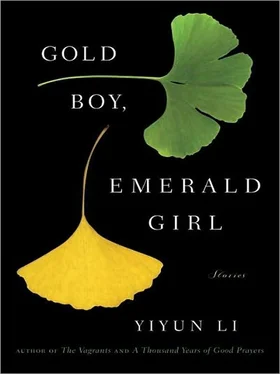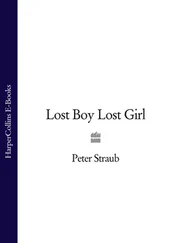“What was it like to grow up with only a father?” Hanfeng asked. He had little recollection of his father, but there were photographs, taken when Hanfeng had turned a hundred days, six months, one year, and then two years old. In all four pictures, he was flanked by his parents, who looked serious and attentive. They would have been called “gold boy” and “emerald girl” at their wedding, enviable for their matching good looks. It must have been his father’s idea to have a family picture taken at every milestone of his life, since after his father’s death Hanfeng had never been in the same photograph as his mother.
Siyu replied that she imagined it was not very different from growing up with only a mother. There was no other parent to whom they could compare the one they had, and love did not have to be balanced and divided between two people; the claiming of loyalty was unnecessary. Siyu did not say these things, but there was a gentleness in Hanfeng’s eyes where before there had been only aloofness, and she knew that he understood.
Hanfeng turned away from Siyu’s gaze and looked out the window. A woman in a heavy mud-colored coat was riding a bicycle and threading through the long line of cars in the street. A young child, bundled up in a gray shawl, so that its gender could not be determined, sat on a bamboo chair affixed to the back rack of the bicycle, as unfazed as the mother was by the impatient honking of drivers around them. Hanfeng pointed out the child to Siyu, knowing that both of them had traveled the streets of Beijing in that way, he behind his mother, she her father.
After the woman and her child had disappeared from sight, Siyu said that when she started to ride her bicycle to school at twelve, her father would get up every morning and run after her until she reached the school gate. She used to be ashamed of being the only one escorted to school by a running father, but she could never say no to him.
“He must be the most loving father in the world,” Hanfeng said.
Siyu nodded. A door behind the counter opened and then closed, and for a moment it seemed that the flickering candles would be extinguished. She had had to squeeze the hand brake often on the downhill ride to the school so that her father’s panting would not be so loud that other people took notice, and only when she was much older did she realize that her father had insisted on running beside her so that she would not become one of the wild youngsters who sped and broke an arm or a skull in an accident. She had always been aware of his love for her and for her mother, even though he had not said much, but in the end she had been the one to make up grand excuses for her absence. You’re still my only daughter, he said to her when she decided not to attend his wedding; you’re part of the family, he said when she told him that she would not be coming home for the Lunar New Year. He did not need her to complicate his life, she replied, knowing that he would stoically accept her proposal of a monthly lunch as their only way of remaining father and daughter.
Ungrateful and coldhearted she must seem in the eyes of old neighbors and family friends, but how could she stay in his sight when she was going through her life with a reckless speed known only to herself, all because of a love she could not explain and did not have the right to claim in the first place? I wonder if I made a mistake by bringing you up alone, her father had said to her at their most recent lunch, taking it as his failure that she had not found a husband. I was afraid of what a stepmother would do to a girl, but perhaps a woman would have made a difference, he said, less guarded and more talkative now in his old age. Siyu shook her head and denied that he had anything to regret. That she had grown up without a mother could be a ready explanation for anything — her oddness in her teenage years, her choice of an unremarkable job despite her excellence in schoolwork, her singleness. Were people to know her secret, they might easily conclude that she had spent her life looking for a mother in her love of an older woman, but Siyu did not believe that things would have turned out any differently had she had a mother.
A beautiful and sad woman, Hanfeng thought as he looked at Siyu’s face. As beautiful and sad a woman, perhaps, as his mother had once been. Could this account for his mother’s wish for a marriage between Siyu and him? Hanfeng had been surprised, at first, that a former student would remain close to his mother. She had not been the kind to pick favorites among her students; nor had she ever encouraged any personal interaction with them, as far as he knew, though he could see why Siyu, motherless and with a gentle and loving father, might seek out a professor despite, or perhaps because of, her sternness. But Siyu seemed to know his mother only in a peripheral way, as a pupil, and Hanfeng wondered if this was why his mother had allowed the younger woman to remain a friend. When Hanfeng was ten, a woman had come from a southern province to see his mother. An unannounced visit, he could tell, when his mother had returned home in the evening and found him shelling peas alongside the guest, their knees almost touching, on two low stools. The woman, who had told Hanfeng that she was a very old friend of his mother’s and was planning to stay with them for a week, left the next morning before he awoke. He was puzzled but intuitively knew not to ask his mother about it. Still, the image of the woman’s face, pale at the sight of his mother, and her hands, which let the peas fall into the pile of shells, stayed with Hanfeng. He could not pinpoint when he understood that there had been betrayals between the two friends, but by the time he left home for college he knew that he would never learn the true story, his mother having long ago decided to live alone with the secret until her death.
AT THE DINNER, both Siyu and Hanfeng felt a shyness around each other, but Professor Dai did not let the awkwardness deter her. “When you are young, you marry for passion,” she said, looking first at her son and then at her future daughter-in-law. “When you’re older, you marry for companionship.”
Hanfeng glanced down at his plate. One day she would die, his mother had said to him the night before, after he had listened to her stumble through a Chopin piece on the piano. There was nothing to grieve about in her death, but she would like to see that he did not repeat her fate. Repeat? Hanfeng asked, pretending that he did not understand and knowing that she could see through him. She would like him to marry Siyu, his mother had said. There were many ways to maintain a marriage, and she expected theirs to be far from the worst.
The same message had been conveyed to Siyu, when Hanfeng was sent to buy a bottle of wine for dinner. She was helping Professor Dai lay the table, and when she looked over, the older woman paired the chopsticks without meeting her eyes. Siyu had never mentioned the strangers she had been matched up with over the years, but one New Year’s Eve, Professor Dai had told Siyu that she shouldn’t get married if it was not what she wanted. They had just finished dinner, and sitting across the table from Professor Dai, Siyu could see the prints of bamboo leaves on the curtain lit up by the fireworks outside. Professor Dai had opened a bottle of wine that year, an unusual addition to the holiday meal, as neither of them was the type to celebrate. You could feel trapped by the wrong man, Professor Dai said. Her voice, softened by the wine, was less steely and almost inaudible beneath the booming of the fireworks. You would have to wish for his death every day of your marriage, she said, but once the wish was granted by a miracle, you would never be free of your own cruelty. Siyu listened, knowing that the older woman was talking about herself, knowing also that both of them would pretend to have forgotten the conversation after that night. Other conversations, on other New Year’s Eves, were never mentioned again. One year, Siyu told Professor Dai about her mother’s suicide; another year, Professor Dai mentioned that her son had no interest in marriage. Professor Dai’s acknowledgment of Siyu’s decision to purchase a secondhand car so that the older woman could avoid taking a crowded bus or enduring a chatty cabdriver was hinted at but not directly stated, and so was her gratitude for Siyu’s alertness, when she failed to answer Siyu’s weekly phone call and Siyu discovered the older woman on the floor by the piano, having suffered a stroke.
Читать дальше
Конец ознакомительного отрывка
Купить книгу












